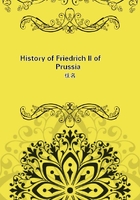
第8章
"History, with faithful Genius at the top and faithful Industry at the bottom, will then be capable of being written. History will then actually BE written,--the inspired gift of God employing itself to illuminate the dark ways of God. A thing thrice-pressingly needful to be done!--Whereby the modern Nations may again become a little less godless, and again have their 'epics'
(of a different from the Schiller sort), and again have several things they are still more fatally in want of at present!"--So that, it would seem, there WILL gradually among mankind, if Friedrich last some centuries, be a real Epic made of his History? That is to say (presumably), it will become a perfected Melodious Truth, and duly significant and duly beautiful bit of Belief, to mankind; the essence of it fairly evolved from all the chaff, the portrait of it actually given, and its real harmonies with the laws of this Universe brought out, in bright and dark, according to the God's Fact as it was; which poor Dryasdust and the Newspapers never could get sight of, but were always far from!--Well, if so,--and even if not quite so,--it is a comfort to reflect that every true worker (who has blown away chaff &c.), were his contribution no bigger than my own, may have brought the good result NEARER by a hand-breadth or two. And so we will end these preludings, and proceed upon our Problem, courteous reader.
Chapter II.
FRIEDRICH'S BIRTH.
Friedrich of Brandenburg-Hohenzollern, who came by course of natural succession to be Friedrich II. of Prussia, and is known in these ages as Frederick the Great, was born in the palace of Berlin, about noon, on the 24th of January, 1712. A small infant, but of great promise or possibility; and thrice and four times welcome to all sovereign and other persons in the Prussian Court, and Prussian realms, in those cold winter days. His Father, they say, was like to have stifled him with his caresses, so overjoyed was the man; or at least to have scorched him in the blaze of the fire; when happily some much suitabler female nurse snatched this little creature from the rough paternal paws,--and saved it for the benefit of Prussia and mankind. If Heaven will but please to grant it length of life! For there have already been two little Princekins, who are both dead; this Friedrich is the fourth child; and only one little girl, wise Wilhelmina, of almost too sharp wits, and not too vivacious aspect, is otherwise yet here of royal progeny. It is feared the Hohenzollern lineage, which has flourished here with such beneficent effect for three centuries now, and been in truth the very making of the Prussian Nation, may be about to fail, or pass into some side branch.
Which change, or any change in that respect, is questionable, and a thing desired by nobody.
Five years ago, on the death of the first little Prince, there had surmises risen, obscure rumors and hints, that the Princess Royal, mother of the lost baby, never would have healthy children, or even never have a child more: upon which, as there was but one other resource,--a widowed Grandfather, namely, and except the Prince Royal no son to him,--said Grandfather, still only about fifty, did take the necessary steps: but they have been entirely unsuccessful; no new son or child, only new affliction, new disaster has resulted from that third marriage of his.
And though the Princess Royal has had another little Prince, that too has died within the year;--killed, some say on the other hand, by the noise of the cannon firing for joy over it! [Forster, Friedrich Wilhelm I., Konig von Preussen
(Potsdam, 1834), i. 126 (who quotes Morgenstern, a contemporary reporter). But see also Preuss, Friedrich der Grosse mit seinen Verwandten und Freunden (Berlin, 1838), pp. 379-380] Yes; and the first baby Prince, these same parties farther say, was crushed to death by the weighty dress you put upon it at christening time, especially by the little crown it wore, which had left a visible black mark upon the poor soft infant's brow! In short, it is a questionable case; undoubtedly a questionable outlook for Prussian mankind; and the appearance of this little Prince, a third trump-card in the Hohenzollern game, is an unusually interesting event. The joy over him, not in Berlin Palace only, but in Berlin City, and over the Prussian Nation, was very great and universal;--still testified in manifold dull, unreadable old pamphlets, records official and volunteer,--which were then all ablaze like the bonfires, and are now fallen dark enough, and hardly credible even to the fancy of this new Time.